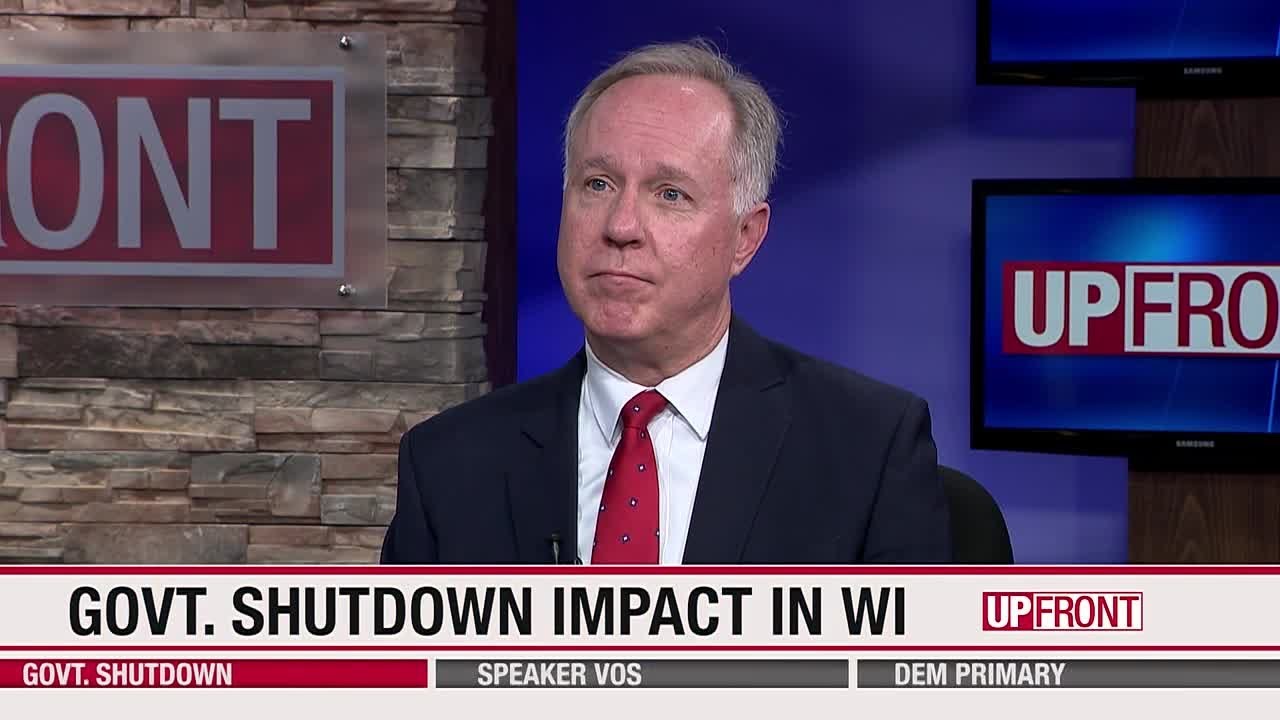Politics
Wisconsin GOP Assembly Speaker Hopes For ‘Consensus’ On Medical Marijuana, But Says New Senate Bill Is ‘Too Broad’

Wisconsin’s GOP Assembly speaker said he hopes lawmakers in the state can “find a consensus” on legislation to legalize medical marijuana. But he added that a new cannabis bill filed by his Republican leadership counterpart in the Senate is “unlikely” to pass his chamber because it is “way too broad and way too wide-ranging.”
“I have tried for five or six years to find a way to get to yes,” Speaker Robin Vos (R) said in an interview with WISN-TV on Sunday. “The idea that we are going to have medical marijuana dispensaries in every city around the state, I don’t know that’s where most people are.”
Last year, Vos unveiled a limited medical cannabis bill that called for a limited program facilitated through state-run dispensaries.
“So we tried to have a much more limited version to say, ‘look, let’s have five or six dispensaries statewide [and] make sure that it’s not in a profit-driven motive, to help people who truly are sick with some kind of a diagnosis,'” he said in the new interview.
But the state-run model proved controversial among his Republican colleagues, however, and it ultimately stalled out. Now, Vos is raising concerns about new legislation introduced last week by Senate President Mary Felzkowski (R) and other GOP lawmakers that would establish a more traditional system of licensed private dispensaries.
“I still think there’s the hope to try to find a consensus, but it looks to me like the version that was released is just way too broad and way too wide-ranging where people worry it will lead to recreational marijuana,” he said. “I don’t want that.”
The speaker said it is “unlikely” the Senate bill could get enough support to clear the Assembly.
“There’s a whole group of Republicans that I understand are opposed to it because they think it’s a gateway to recreational marijuana, which would be awful for Wisconsin,” he said. “There’s another group who want to have legalized marijuana, and that’s the Democrats—so they don’t want to have any real restrictions.”
“So trying to find a consensus in the middle is super challenging, which is why I thought the bill we had last time—where it was a very skinny version, very scaled down, focusing only on the people who are truly sick and needy—had the best chance to pass. But even that had problems. So now this one is much more all encompassing. I can’t see a scenario where it passes, but only time will tell.”
Asked whether he could support the Senate leader’s new bill, Vos said he’s “probably” a no on it should it ever come to a vote.
Last week, Felzkowski (R), who had previously sponsored a different medical cannabis bill, announced in a press release that she filed the new measure alongside Sen. Patrick Testin (R), with an Assembly companion version from Assemblymember Patrick Snyder (R).
The text of the proposal wasn’t immediately available, but Felzkowski’s prior bill would have allowed doctors to issue medical cannabis recommendations to patients with one of eight conditions, including cancer, seizure disorders, post-traumatic stress disorder and multiple sclerosis.
The legislation was fairly restrictive, as it prohibited smokable marijuana products and wouldn’t have allowed patients to grow cannabis for personal use. Patients could have only obtained cannabis preparations in the form of oils, pills, tinctures or topicals.
“Someone who suffers from a serious health condition should not have to make the choice to travel to another state or break the law so they can try an alternative medicine for relief,” Felzkowski, a cancer survivor, said in a press release.
“This legislation is about giving our friends, family members, and neighbors suffering from a chronic illness the freedom to explore another option with their doctor,” she said. “This is also a chance for small businesses in our state to take part in this market with reasonable regulations on making and selling these products, all while still protecting public safety.”
As the 2025 session was set to get underway, the Senate leader said she was “hoping to have a conversation” in the legislature about legalizing medical marijuana this year—though Vos, the Assembly speaker, still represented “an obstacle,” she added.
Meanwhile, a Republican candidate for governor of Wisconsin said in July that he was “open to considering different opportunities” when it comes to legalizing medical or adult-use marijuana in the state, though he has provided little in the way of specifics so far.
On the Democratic side, current Gov. Tony Evers (D), who supports legalizing cannabis, will not be seeking re-election. But he said in June that if his party can take control of the legislature, the state can “finally” legalize marijuana so that residents don’t have to go to neighboring Illinois to visit its adult-use market.
Separately in June, a poll from Marquette Law School found that two in three Wisconsin voters support legalizing marijuana.
The survey found that support for cannabis reform has generally increased over time since the institution first started tracking public opinion on legalization in 2013, with 67 percent of voters now backing the policy change. That’s 17 percentage points higher than the 2013 results.
Democrats are the most likely to favor legalizing cannabis, at 88 percent, followed by independents (79 percent). However, a majority of Republicans (56 percent) said they’re still opposed to adult-use legalization.
Underscoring the importance of party control, the state’s Republican-controlled Senate and Assembly this summer rejected another attempt to legalize marijuana, defeating amendments to budget legislation that would have ended prohibition in the state and established new medical and recreational cannabis programs.
Evers has routinely attempted to change that policy as part of his budget requests—and Democratic leaders have similarly pushed for reform.
Republicans in the legislature also cut the marijuana provisions from a state budget proposal in May, as they’ve done in past sessions.
Despite Republicans’ move to cut legalization from the budget legislation, party leaders recently acknowledged that the debate over medical marijuana legalization is “not going to go away,” and there’s hope it can be resolved this session.
—
Marijuana Moment is tracking hundreds of cannabis, psychedelics and drug policy bills in state legislatures and Congress this year. Patreon supporters pledging at least $25/month get access to our interactive maps, charts and hearing calendar so they don’t miss any developments.
![]()
Learn more about our marijuana bill tracker and become a supporter on Patreon to get access.
—
“I don’t think anyone is naive enough to think that marijuana and THC products aren’t present in the state of Wisconsin when they are readily available over state lines, so I think we need to come to an answer on this,” Assembly Majority Leader Rep. Tyler August (R) said in February. “I’m hopeful that we can.”
“If we’re going to call it medical marijuana, it needs to be treated like a pharmaceutical. But the marijuana debate is going to be something that is not going to go away,” Sen. Dan Feyen (R), the assistant majority leader, said at the time. “The margins are tighter.”
Evers previewed his plan to include marijuana legalization in his budget in January, while also arguing that residents of the state should be allowed to propose new laws by putting binding questions on the ballot—citing the fact that issues such as cannabis reform enjoy sizable bipartisan support while the GOP-controlled legislature has repeatedly refused to act.
Previously, in 2022, the governor signed an executive order to convene a special legislative session with the specific goal of giving people the right to put citizen initiatives on the ballot, raising hopes among advocates that cannabis legalization could eventually be decided by voters. The GOP legislature did not adopt the proposal, however.
Evers said in December that marijuana reform is one of several key priorities the state should pursue in the 2025 session, as lawmakers work with a budget surplus.
Days after he made the remarks, a survey found the reform would be welcomed by voters in rural parts of the state. Nearly two thirds (65 percent) said they support legalizing cannabis.
Last May, the governor said he was “hopeful” that the November 2024 election would lead to Democratic control of the legislature, in part because he argued it would position the state to finally legalize cannabis.
“We’ve been working hard over the last five years, several budgets, to make that happen,” he said at the time. “I know we’re surrounded by states with recreational marijuana, and we’re going to continue to do it.”
A Wisconsin Democratic Assemblymember tried to force a vote on a medical cannabis compromise proposal last year, as an amendment to an unrelated kratom bill, but he told Marijuana Moment he suspects leadership intentionally pulled that legislation from the agenda at the last minute to avoid a showdown on the issue.
Meanwhile, the state Department of Revenue released a fiscal estimate of the economic impact of a legalization bill from then-Sen. Melissa Agard (D) in 2023, projecting that the reform would generate nearly $170 million annually in tax revenue.
A legislative analysis requested by lawmakers estimated that Wisconsin residents spent more than $121 million on cannabis in Illinois alone in 2022, contributing $36 million in tax revenue to the neighboring state.
Evers and other Democrats have since at least last January insisted that they would be willing to enact a modest medical marijuana program, even if they’d prefer more comprehensive reform.




